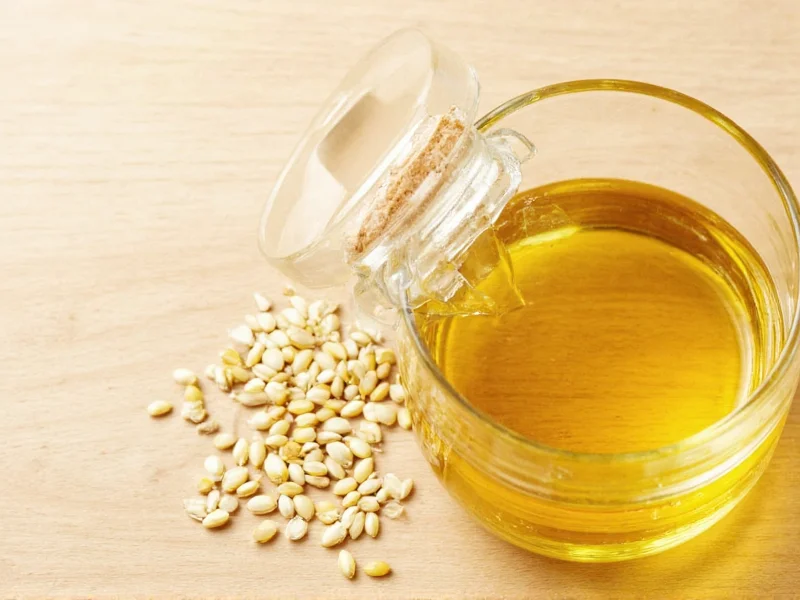Sesame oil, a staple in many Asian cuisines and increasingly popular worldwide, does indeed expire. Understanding its shelf life is crucial for both culinary quality and food safety. Unlike some pantry staples that maintain quality for years, sesame oil's delicate fats make it susceptible to oxidation and rancidity over time.
Understanding Sesame Oil Shelf Life
The expiration timeline for sesame oil depends on several factors including whether it's toasted or regular, if it's opened, and storage conditions. Regular sesame oil (made from raw seeds) generally has a longer shelf life than toasted sesame oil (made from roasted seeds) because the roasting process creates compounds that degrade faster.
Unopened vs. Opened Sesame Oil
Properly stored unopened sesame oil maintains peak quality for 12-24 months past the production date. Once opened, exposure to air significantly reduces its shelf life. Here's a detailed comparison:
| Type of Sesame Oil | Unopened Shelf Life | Opened Shelf Life |
|---|---|---|
| Regular Sesame Oil | 18-24 months | 9-12 months |
| Toast Sesame Oil | 12-18 months | 6-9 months |
| Refrigerated Sesame Oil | 24-36 months | 12-18 months |
How to Tell If Sesame Oil Has Gone Bad
Recognizing rancid sesame oil is essential for both flavor quality and health reasons. Here are the key signs that your sesame oil has expired:
- Smell test: Fresh sesame oil has a nutty, pleasant aroma. Rancid oil develops a sharp, bitter, or chemical-like odor.
- Taste test: If it tastes bitter, sour, or simply "off" compared to when you first opened it, discard it.
- Visual inspection: While sesame oil naturally darkens with age, significant cloudiness or separation indicates spoilage.
- Texture changes: Rancid oil may feel sticky or thicker than normal when rubbed between fingers.
Never rely solely on the expiration date printed on the bottle. Storage conditions dramatically affect actual shelf life. Always perform these sensory checks before using sesame oil that's been stored for several months.
Maximizing Sesame Oil Shelf Life
Proper storage significantly extends sesame oil's freshness. Follow these evidence-based storage recommendations:
- Keep it cool: Store sesame oil away from heat sources. The ideal temperature is below 70°F (21°C).
- Avoid light exposure: Use dark glass bottles or store in opaque containers. Light accelerates oxidation.
- Minimize air contact: Always tightly seal the bottle after each use. Consider transferring to a smaller container as you use it up.
- Refrigeration option: For longest shelf life, especially with toasted sesame oil, refrigerate after opening. Note that refrigeration may cause cloudiness, which disappears at room temperature.
- Prevent cross-contamination: Never pour used oil back into the original bottle, and avoid introducing water into the container.
Health Implications of Using Expired Sesame Oil
Consuming slightly rancid sesame oil won't cause immediate food poisoning, but it does present health concerns. Rancid oils contain free radicals and aldehydes that may contribute to inflammation and oxidative stress when consumed regularly.
Nutritionally, rancid sesame oil loses its beneficial compounds including vitamin E and healthy fats. The oxidation process creates compounds that may have negative long-term health effects. While occasional use of mildly rancid oil likely poses minimal risk, consistently using expired sesame oil isn't advisable.
Special Considerations for Cooking with Sesame Oil
Sesame oil's smoke point (between 350-410°F depending on type) decreases as it ages. Using expired sesame oil for high-heat cooking can create harmful compounds more readily than fresh oil. For best results in cooking:
- Use regular sesame oil for stir-frying and moderate-heat cooking
- Reserve toasted sesame oil primarily for finishing dishes and dressings
- Never reuse sesame oil that has been heated to smoking point
- Discard oil that develops an off smell during cooking
Practical Tips for Sesame Oil Management
To ensure you always have fresh sesame oil available:
- Buy smaller quantities if you don't use it frequently
- Mark opening dates on bottles with permanent marker
- Store backup bottles in a cool, dark pantry away from the stove
- Consider purchasing from retailers with high turnover for fresher products
- When in doubt about freshness, perform the sniff test before using











 浙公网安备
33010002000092号
浙公网安备
33010002000092号 浙B2-20120091-4
浙B2-20120091-4